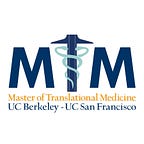Program Highlight — “Lean Transfer”
In the ever-evolving landscape of medical technology innovation, the demand for professionals who can seamlessly weave between the boundaries of bioengineering, patient care, and business is more pertinent than ever. The Master of Translational Medicine Program at UC Berkeley and UCSF offers its students the opportunity to not only become experts at transforming new biomedical discoveries into real-world clinical products but also to be multidisciplinary leaders and innovators who reshape the way we think about healthcare.
The MTM program’s highly specialized, but comprehensive, curriculum ensures that graduates are not just skilled engineers or savvy businesspeople but are, instead, versatile professionals capable of tackling pressing healthcare challenges with a blend of expertise that spans disciplines.
At UC Berkeley, Darren Cooke and Rhonda Shrader stand as pivotal educators in the fusion of entrepreneurship, innovation, and healthcare. Darren Cooke holds the position of Executive Director at the Berkeley Life Sciences Entrepreneurship Center and serves as a professional faculty member at the Haas School of Business, where he also leads the Bio Track for the Berkeley SkyDeck startup accelerator. His expertise extends to teaching entrepreneurship within the Haas School of Business and for the Innovation Corps (I-Corps) programs backed by the National Institutes of Health and the National Science Foundation. Rhonda Shrader, as the Executive Director of the Berkeley Haas Entrepreneurship Program and the Bay Area Node for NSF I-Corps, enriches the entrepreneurial ecosystem with her extensive background in launching and developing startups across various sectors, including biotech and regenerative medicine. As an early team member of MIT-spinout Organogenesis, one of the first publicly traded regenerative medicine companies, and a founder or early-stage team member at startups in diverse fields, Shrader brings invaluable real-world insights to her teaching. Their MBA course at the Haas School of Business, open to a wide array of graduate students, including those from the MTM program, underscores a vital principle: to innovate is not just to invent but to understand the journey from the lab bench to the patient’s bedside.
Cooke’s and Shrader’s MBA295T course “Lean Transfer”, dives into the essence of market needs finding — a process critical for any successful venture in the biotech and healthcare sectors. This course, open to MTM students, encapsulates the essence of hands-on learning by immersing participants in the process of building startups around deep technology. Drawing upon the foundational principles of Steve Blank’s Lean Launchpad courses, Lean Transfer thrusts students into the dynamic world of entrepreneurship.
Participants in the course form teams, selecting from a pool of existing UC Berkeley intellectual property (IP) created by some of the university’s most esteemed inventors. This IP not only comes from Berkeley’s vaults but also includes non-classified patents through educational partnerships with prestigious institutions like Berkeley Labs, NASA, NSA, and other federal agencies. The course begins with inventors pitching their technologies, providing students — a diverse mix from various graduate programs, including the M.Eng program at the Fung Institute, Information Management and Systems (MIMS), Information and Data Science (MIDS), Information and Cybersecurity (MICS), Translational Medicine (MTM), and doctoral programs — an unparalleled opportunity to engage directly with cutting-edge technologies.
Lean Transfer is not just about learning a methodology; it’s a gateway for future pioneers of technology and inventors alike to grasp the intricacies of commercializing world-class technologies. Students undergo an intensive customer discovery process involving over 80 stakeholder interviews, all aimed at answering a critical question, “If you brought it to market, would anyone buy it?”
This exploration is underpinned by the support of a venture capital-sponsored prize of $10,000 to the team that most convincingly demonstrates the commercial potential of their project. Last year, a group of MTM students won this prize for an I-Corps style research project focused on a startup emerging from the lab of Nobel Laureate, Jennifer Doudna, Ph.D. The project centered on Cas9-Encoded Delivery Vehicles (Cas9-EDVs), a groundbreaking in vivo technology poised to enhance CRISPR therapy for sickle cell anemia and other genetic diseases. This marks a significant achievement for MTM students in the journey from discovery to delivery, embodying the essence of what the program strives to achieve.
This blend of bioengineering, patient care insight, and business acumen is what sets MTM graduates apart, enabling them to navigate the complexities of the healthcare industry and bring transformative solutions to life. By engaging directly with the technologies that will shape the future of medicine and the lives of patients around the globe, MTM students are uniquely positioned to lead the charge in this new era of medical technology innovation.
In the ever-evolving landscape of medical technology innovation, the Master of Translational Medicine Program at UC Berkeley and UCSF, along with dedicated educators like Cooke and Shrader, are illuminating the path for a new generation of innovators. These multidisciplinary leaders, equipped with the knowledge, skills, and experiences gained through the MTM program, are ready to confront the healthcare challenges of tomorrow, transforming new biomedical discoveries into real-world clinical products. Through their endeavors, they not only advance the field of healthcare but also redefine what it means to be at the forefront of medical technology innovation.
